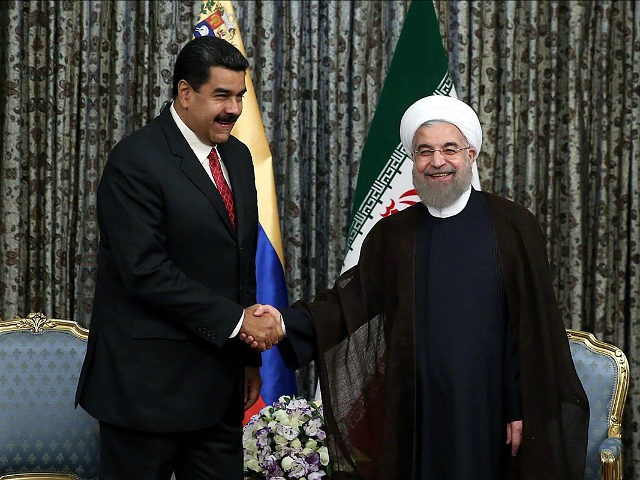A new report in Bloomberg reveals that U.S. authorities are investigating evidence suggesting that the socialist government of Venezuela paid Iran “hundreds of millions” as part of a money laundering scheme designed to avoid human rights sanctions imposed on the Islamic Republic.
Bloomberg’s report, based on a conversation with Venezuelan diaspora leader Martín Rodil, cites an engineer for the state-owned oil corporation Petróleos de Venezuela (PDVSA), who says documents exist that show the government of Venezuela paying Iran to build housing units at $74,000 an apartment, far more than the construction costs.
“The documents appeared to detail the housing deals and payments to Swiss bank accounts through JPMorgan Chase—a potential violation of U.S. law. The investigation is ongoing; PDVSA hasn’t been charged with illegal activity involving Iran,” Bloomberg reports. The scheme may have resulted in a total of $3 billion in revenue for Iran, the leading U.S.-designated state sponsor of terrorism in the world.
While PDVSA officials are not yet facing formal charges for deals with Iran, Bloomberg notes that the corporation is embroiled in a sweeping corruption scandal similar to that plaguing the state-owned oil corporation of neighboring Brazil, Petrobras. Up to $1.9 billion have allegedly gone missing from PDVSA’s internal coffers in recent funding audits. The opposition-controlled National Assembly found $11 billion went missing from PDVSA funds between 2004 and 2014, “more than the budget of five Central American countries.”
The PDVSA corruption scandal has spilled over into the United States, where a Houston court is expected to see a criminal investigation into a million-dollar money laundering scheme that, like Petrobras is suspected of doing, overcharged on vast government projects, allowing officials to pocket the change.
Venezuela and Iran have enjoyed close diplomatic relations for the past 17 years, since socialist dictator Hugo Chávez took power. Chávez’s government has been accused of illegally purchasing weapons from a sanctioned Iran.
The two governments routinely support each other’s interests on the global stage. Most recently, current dictator Nicolás Maduro said on national television that he agreed with his Iranian counterpart Hassan Rouhani that OPEC should meet with leaders of non-OPEC nations, like Russia, to “establish a new mechanism for markets and oil prices,” without elaborating. Venezuelan government representatives recently visited Moscow “to try to bring the Russians onboard for a production cut,” according to The Wall Street Journal. Iran’s readmission into the oil market, the product of the U.S.-brokered Iranian nuclear deal, has sent oil supplies skyrocketing and prices plummeting.
Iran and Venezuela’s ties are far from merely economic, however. Venezuela has long tolerated the presence of Iranian “cultural centers” national security officials have accused of helping spread the influence of Iran’s terrorist proxy organization Hezbollah in the region. Multiple reports — including a confession from a former diplomat at the Venezuelan embassy in Baghdad — have alleged that Venezuela has used its embassies to issue false national documents to members of Hezbollah. Armed with Venezuelan passports, birth certificates, and other identifying documents, these individuals can travel more freely through Latin America and the United States.
One report estimates that up to 300 Hezbollah operatives have acquired false Venezuelan government documents.
The deal, according to Spanish reporter Emili J. Blasco in his book Boomerang Chávez, was the product of a 2007 meeting between Maduro and Hezbollah terror chief Hassan Nasrallah in Damascus. Venezuela also enjoys friendly relations with Syrian dictator Bashar al-Assad.

COMMENTS
Please let us know if you're having issues with commenting.